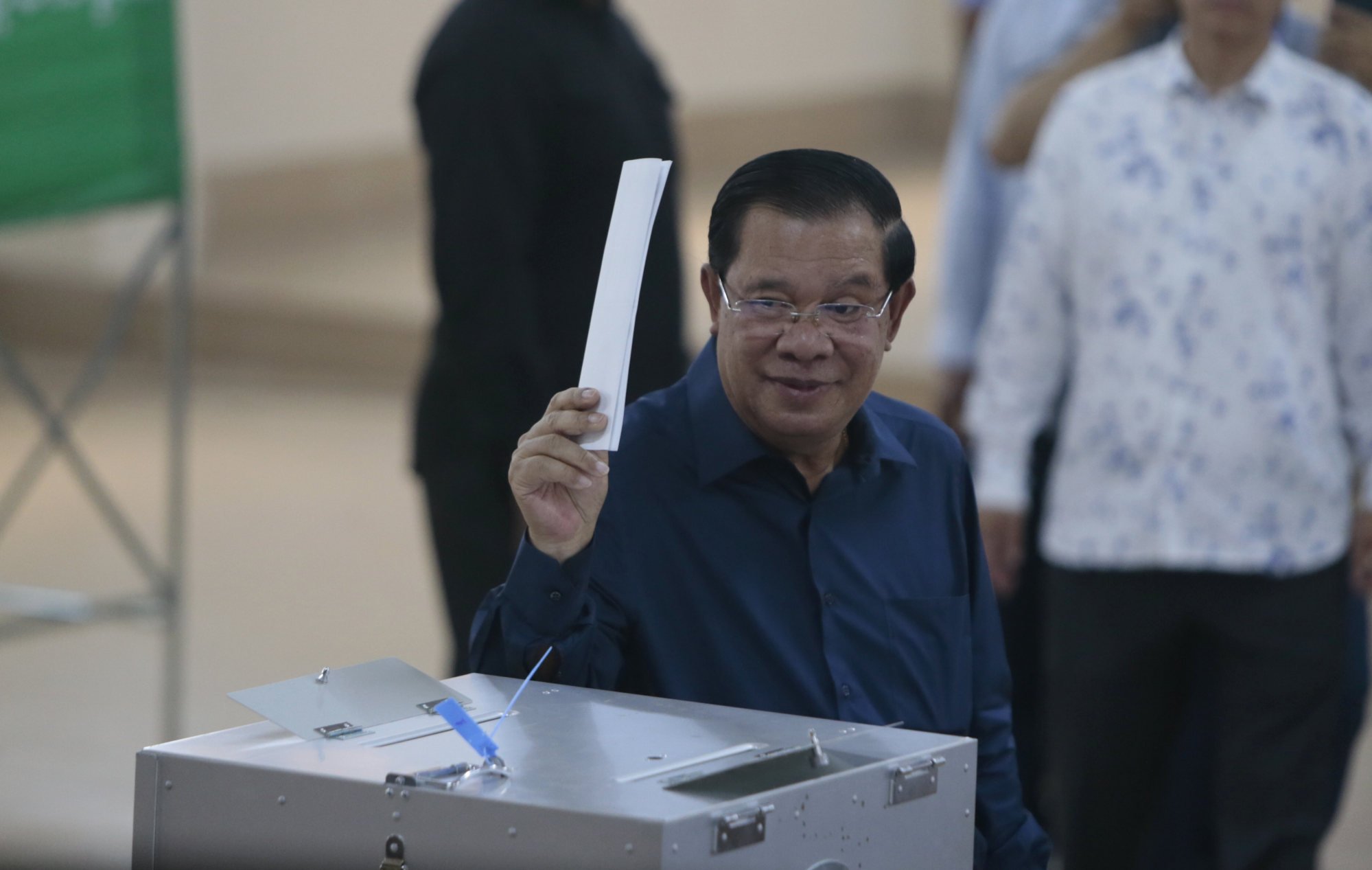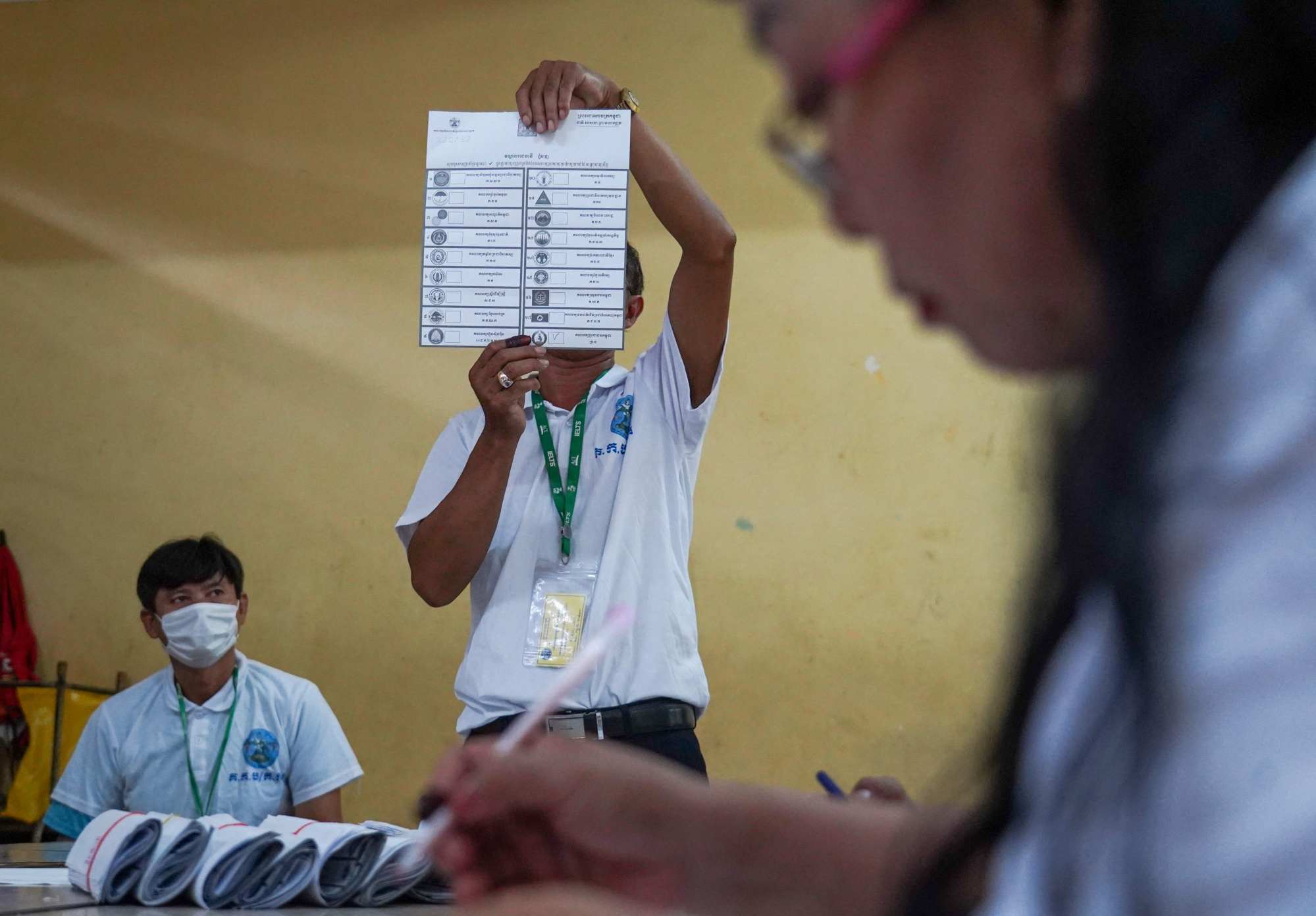
Cambodians expect more of the same as Hun Sen’s son set to take power: ‘we have no hope’
- Hun Sen has for years aimed for his son Hun Manet to take over, boosting the younger man’s profile and control of Cambodia’s security apparatus
- Critics say Hun Manet’s ‘only political programme is to follow his father’, but note that he may face a less pliant public than under Hun Sen
The 70-year-old leader said in a speech on Wednesday that he would step down as prime minister. “Hun Manet...will become the prime minister in the coming weeks,” he said, adding the new premier will be appointed on August 10.
“I will continue as the head of the ruling party and member of the National Assembly,” he said. The newly elected parliament will convene on August 21 and a new cabinet would be sworn in on August 22.

Cambodia’s Hun Sen wants ‘back in Beijing’s orbit’ amid US balancing act
Hun Sen has systematically repressed the opposition throughout his nearly four-decade career as leader, from his coup after losing Cambodia’s first post-war election in 1993, until this year when his government banned the Candlelight Party from contesting.
Hun Manet, 45, took no questions from a swarm of reporters on Sunday as he arrived at his Phnom Penh polling station with wife Pich Chanmony, the daughter of a former minister.
Instead, he took to social media in a triumphant mood on Monday, hailing his party’s victory across multiple platforms.

“The Cambodian people have clearly expressed their wills through votes,” he wrote. “An overwhelming number have expressed support for the Cambodian People’s Party.”
He thanked Cambodians “for choosing to vote, and especially for all the love and confidence in the CPP”.
Despite his increasingly public presence, little is known about Hun Manet. He was the first Cambodian graduate of the US’ West Point Military Academy in 1999, and received degrees from other US and British schools.
We have not seen any of his outstanding [qualities] as a successive leader besides fulfilling his duty based on what his father has already laid out
However, stepping into his father’s role will necessitate a higher profile both at home and abroad.
“So far, we have not seen any of his outstanding [qualities] as a successive leader besides fulfilling his duty based on what his father has already laid out and [he is] in the stage of learning how to lead the country,” Cambodian political analyst Seng Sary told This Week in Asia.
Sary added that Hun Manet had yet to win any middle-ground citizens who were not fans of the CPP, so it would be critical for him to try to do that early in his premiership.
Yet for some voters, a promotion with Hun Sen’s blessings was already an ample endorsement.
“Maybe he can be as good as his father,” said Phoeun Chanra, 38.
Crisis looming?
Hun Sen sent a voice message on Sunday evening urging the more than 400,000 voters who spoiled their ballots to turn themselves in, again revealing his vexation with a campaign led by exiled opposition figure Sam Rainsy to spoil ballots.
At least one man, a 37-year-old from Phnom Penh, was arrested and detained after he was caught taking a photo after he spoiled his ballot.

One surprise election winner was Funcinpec, the royalist party, which netted 9.2 per cent of votes and five seats in the National Assembly.
Experts say the party’s performance may have less to do with their platform – which includes defending the monarchy and increasing the monthly minimum wage to US$300 – than the symbolism: Funcinpec president Prince Norodom Chakravuth is the son of the late Prince Norodom Ranariddh, the only non-CPP candidate to win the popular election in 1993.
Fear may have driven many others to the polls.
Oeun, 53, said she was unimpressed with the choices on the ballot paper.
Her community’s requests to protect their homes, which stand by Boeng Tamok – one of Phnom Penh’s last lakes that’s poised to be filled in to build housing estates – had gone unheard, she said.
Why Cambodia has mixed feelings about China-built Phnom Penh-Sihanoukville road
Yet she decided to vote because of the repercussions of not doing so.
“If we don’t vote or cross out [the ballot], they will arrest and jail us, they warned and threatened us. As people, we are worried,” she said.
With the CPP the only real game in town in closely monitored local polling stations, critics say much of the public support for Hun Sen – and therefore his son – is a mirage.
Exiled political commentator Kim Sok said that majority support for the CPP is concocted and the future prime minister’s “only political programme is to follow his father”.

As Hun Manet prepares to move into the centre of Cambodian power – albeit with his father close at hand – experts say he may face a less pliant public, who are already worn down by the Hun Sen years, which saw the spoils of breakneck development shared unevenly across one of Southeast Asia’s poorest countries.
“It is an election that will create a crisis: political, democratic, human rights, diplomatic and economic … Neither the state nor the people can solve it … It requires power to shift away from the Hun family to solve all these crises,” Kim Sok said.
Brak Sophea, a community leader at the lake community in Boeng Tamok, expects the son to be like the father.
“How can we hope that he will think of people when he takes office?” she said. “We have no hope.”
Additional reporting by Reuters



